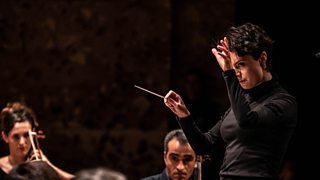How to become – and succeed as – a conductor

It’s been a long time coming – centuries, in fact – but the gender balance in the profession of conducting is finally tilting away from male domination.
The British-Argentinian conductor Gabriella Teychenné shared her curiosity about music’s power to communicate with listeners to Radio 3’s Inside Music – here she offers insights on what it’s actually like to stand on a podium and direct groups of seasoned musicians.
What is a conductor?
For me a conductor is an organiser and manipulator of live sound. We do this by communicating through gesture to the orchestra. Questions of balance and intonation are of course important, but our fundamental role is to inspire a group of instrumentalists to come together and create a whole.
What made you choose this path?
No key steps – it was a long and organic process. I started as violinist, but the key thing was I always trained as a musician. I was exposed to orchestral music, I read scores, I was always interested in different sounds. The textures, colours, harmonies and rhythms of an orchestra intrigued me. I knew I wanted a life in music but I didn’t think about becoming a conductor until much later while at college.
My main musical training was classical in orchestras, but I also played saxophone and guitar – so I was also into jazz and folk music too. I also dabbled in klezmer and gypsy music, and at university I got really into electronic music. Fundamentally I was always just obsessed by sound!
What qualities does a conductor need?
You do need to be quite obsessive to be a conductor! You’re not playing an instrument so the music has to come from within. It comes from your life understanding and life experience.
You have to LISTEN, you have to respond and you also have to generate ideas – so three things at once. It’s a balance between not being too passive but equally not too intrusive. You’re always walking a fine line between trying to generate energy whilst also allowing musicians to play without interfering too much.

Is there a conductor you admire, and if so, why?
Pierre Boulez. He was an incredible musician and technician, a perfect combination of intellectual and emotional. He didn’t LOOK that flamboyant when you watched him, but he could communicate so effortlessly. When you watch film of him, often small looks are all that it takes. He knows the sounds he wants. Even if you watch him and think he might not look that impressive, the sound he gets is amazing. He transmits an energy.
Video published to YouTube by EuroArts. Third-party content may contain ads. More information in our FAQs
How do you inspire your musicians?
You need to try and be a good communicator. I hate the word “leader” – it has certain connotations – but you do need a willingness to take responsibility for what is going on.
Conductors need huge respect for the orchestra. We’re fellow musicians.
There is always an element of distance due to requirements of the job. Staying objective is important. You need to almost “sit on top of” the sound, which means a certain distance.
Do you stand aloof or are you one of the gang?
It’s important to be able to connect with the orchestra immediately – but a musical connection not a social connection. You all have a mutual connection to understand each other artistically. Without that it’s not really going to work.
Of course if you spend lots of time with an orchestra you may make friends with the musicians, but that’s very much contextual from job to job…
People talk about the ‘maestro myth’ and the ‘cult’ of the conductor. What’s your take on that?
Conductors can be mythologised because you are the conduit. I think it’s a two-way thing. If reverence comes when a conductor can get an incredible result with an orchestra that’s fine to admire. But it’s come through the craft of music-making – not the personality. The conductor has drawn people in and communicated with them. It’s always a joint effort – conductors need to have huge respect for the orchestra. We’re fellow musicians.
But when people revere a conductor because they are famous or they look important then that’s superficial and problematic. Strength and power does not necessarily mean egotism and narcissism. You need to be sure of yourself but it’s about inner strength. We’re human beings – not magical creatures!
Baton or no baton?
I care about my baton a lot! It’s not an accessory or to look cool – it’s a tool to help you communicate through gesture. As a conductor you need to be able to be clear with your intentions and for me a baton is an extension of that intention.

The baton should feel almost as though it’s filled with music. It’s not a case of “here I am with my magic wand!”
You can’t forget that you are being watched all the time. Every move and gesture needs meaning.
Any downsides?
I’m always concerned about doing justice to the music. It should be your number one priority and your biggest concern. On one hand you have an intellectual objective and the need to listen very carefully, and on other hand there is an emotional and sensual side. Combining them at once can be very hard.
You do spend quite a bit of time alone and I think you have to be comfortable in your own head and with your own company. I’m quite happy with my own company, which fits with my personality.
And the upside?
My favourite moments are often near the end of rehearsals when it all starts coming together. Suddenly there is a connection with the music and the orchestra. Everything starts to feel natural like breathing and that feeling is amazing.
Has any revelation about conducting hit you in the face?
Less is more – very important.
What advice would you offer to a young conductor to prevent crash-and-burn?
Don’t make a song and dance about it – be prepared mentally and just be a musician. You need a degree of humility as a young conductor as you’ve got lots to learn. Remember that musicians are the masters of their instruments, not you. If the conductor recognises these things then the orchestra will respect and empathise with you. And then you can forgot about the rest.
It’s not about trying to impress or show off. It’s about being open and honest.
-
![]()
Inside Music – Experience some deep listening...
Gabriella Teychenné shares her curiosity about music's power to communicate in diverse ways, with ballet music by Prokofiev, a Stomp by Duke Ellington, a Tchaikovsky song, and music by pioneering experimentalist Pauline Oliveros, conjuring up otherworldly sounds with accordion, trombone and didgeridoo. Photo © Simon Pauly

Conducting matters at Radio 3
-
![]()
The Listening Service – What's the point of the conductor?
Is it all about their ego, their clothes, their ability to beat time or their emotional outpouring onstage, asks Tom Service, or it is something else entirely?
-
![]()
This is what a conductor looks like
Find out the perspectives and experiences of eight women in musical leadership.
-
![]()
Do you have what it takes to be a conductor?
Alice Farnham has a programme to encourage more female musicians to consider careers in musical leadership.
-
![]()
Inside music
Get to know a selection of music from the inside with a leading musician.





